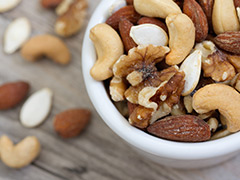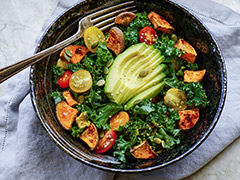Eating Better for a Longer Life

Sadly, there is no fountain of youth. However, what we eat can play a big part in how our bodies age. Because we tend to lose muscle as we age, and because our metabolisms begin to slow down, it can be hard to balance intake with weight. Maintaining a healthy weight puts less pressure on joints and reduces strain on the heart. So let’s take a look at some of the foods that are helpful in healthy aging.
VEGETABLES
This isn’t news: vegetables are good for your body. But as you age, the fiber and vitamins that vegetables provide become more and more important. Vitamin K from dark, leafy veggies strengthens bones. Vitamin A from sweet potatoes and carrots keep your eyes and skin healthy and infection-free. Tomatoes may help fight prostate cancer.
But that’s not all. Many vegetables (and berries) contain antioxidants that help fight free radicals which contribute to the aging process. Look for colorful veggies like beets, tomatoes and blueberries for the highest antioxidant counts. And don’t forget, you should be looking to get between 5 and 9 servings each day.
WHOLE GRAINS
Whole grains are minimally processed, which means they retain a lot of their beneficial nutrients, including fiber which can help you feel full as well as aiding digestion. Whole grains have also been shown to reduce the risks of certain cancers, heart disease and even type 2 diabetes.
DAIRY
Look for dairy products that are fortified with vitamin D. Vitamin D helps you absorb more calcium, keeping bones healthier and stronger. It has also been shown to aid reduction of colon, breast and prostate cancer risks.
FISH
Apart from being lower in fat and calories than other meats, fish contains omega-3 fatty acids. These compounds are strongly linked to brain health and nervous system development. Eating fish as little as 2 or 3 times a week can improve brain function and lower the risk of dementia in aging patients.
OLIVE OIL
Like the omega-3s in fish, the monounsaturated fat in olive oil is good for your brain. Additionally, a compound called oleocanthol produces similar effects to ibuprofen and other NSAID pain relievers, naturally reducing inflammation in your body. And one last benefit for the fellas: in men, olive oil raised the level of HDL, helping clear fat from blood vessel walls.
Keep your meals balanced, watch out for junk foods and added sugars, and stay active. Coupling these tips with the ingredients above, you’ll be enjoying delicious meals for years to come.

